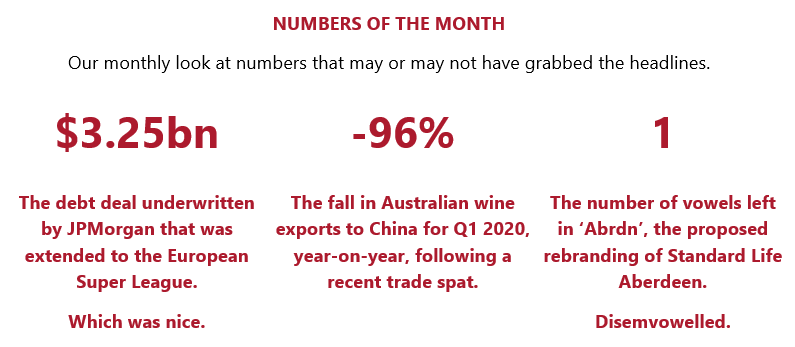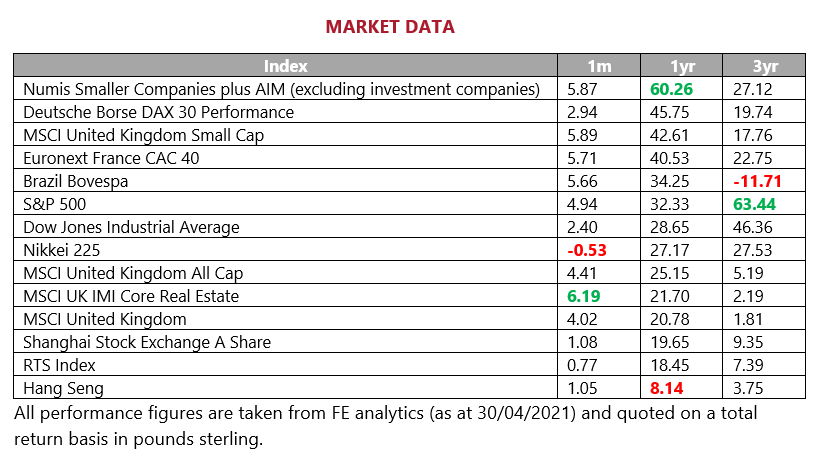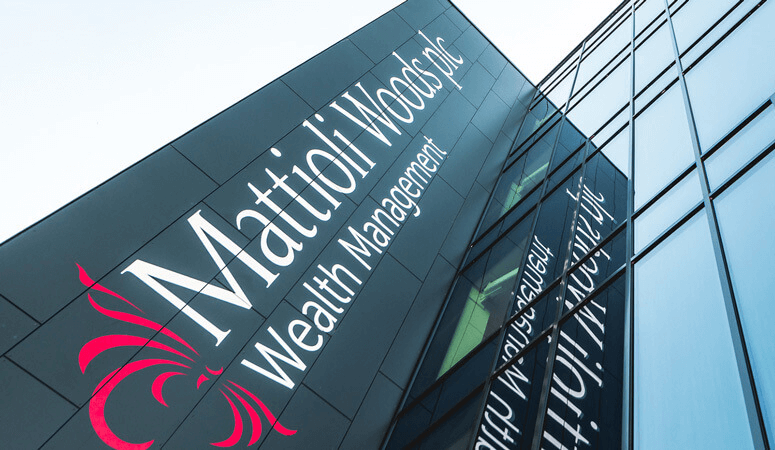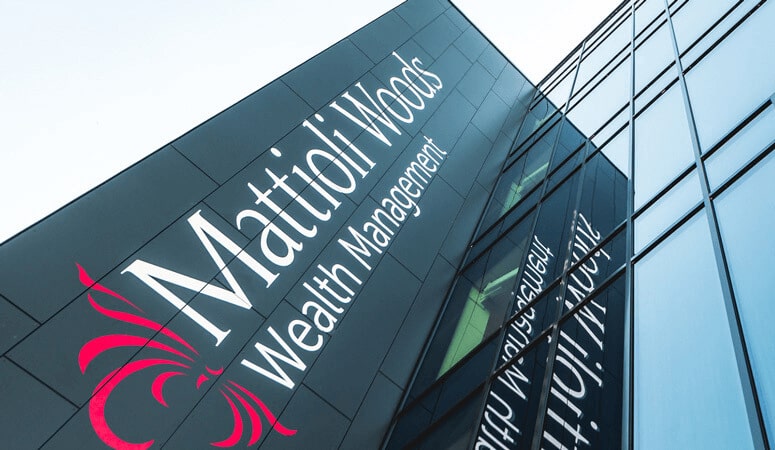United Kingdom - May 2021
Our theme this month is news. “There is nothing but news, how can you possibly cover such a broad topic” … we understand … and yet, on 18 April 1930 in the 8.45pm BBC bulletin, the announcer stated, “there is no news” and played music instead. Simpler times … but was there really no news? What we call news today, would it all have qualified as news in a bygone era? And when we agree something is news (see below), is it important for investors? Let’s see …
For example, from recent headlines, does “Will China invade Taiwan” matter more or less than the (at first sight) less troubling “US vows to respond to irresponsible Russian acts”, or the apparently simply whacky “$14,000 worth of sandwiches valued at $100m?” For brevity, just a line or two from us on each, but you will get the picture …
A deli in New Jersey that sold $14,000 of sandwiches in 2020 was valued last week (a value based on its share price) at circa $100m – a sign more of the very easy money currently sloshing around the global system than any real investment opportunity – lunacy, but other than that, a sign that not every investment making money makes sense (and therefore to be careful). Well, maybe it represents a worrying signal (red light flashing) that central bank support is creating bubble conditions, and that is pretty concerning.
US and Russian relations are not great, and actions such as cyber-attacks and aggression in Ukraine don’t do much to help, but US Secretary of State, Blinken, would prefer a more “stable and positive” relationship. Impacts on the oil price, and a stable (or otherwise) Eastern Europe are certainly of more concern than the value of Hometown Deli, so this is one to watch, but not to be too obsessed by.
Chinese sabre-rattling, including airplanes entering Taiwanese airspace, is not new, but has recently been increased – a so-called ‘grey war’ frustrating Taiwan’s leaders and testing US resolve in the region being most likely; here is the key point – the US (and probably the wider developed world) cares more for trade (and especially the access to Taiwan’s electronics supply chain) than freedoms, but cannot afford Taiwan to ‘fall’. This makes it an interesting and potentially tricky issue to call – for now, we see China as sufficiently bothered about its economic place to avoid an escalation … another one to watch.
The economic news in the UK is getting better – UK-centric businesses look well placed to benefit from a broadly vaccinated population starting to ‘consume’ again, and a general reopening of the economy in the coming weeks seems priced into many assets … the threat is a new variant and/or problems in maintaining vaccinations beyond the initial two doses. It may seem political, but actually booster shots really do matter … otherwise further lockdowns seem assured.
Term or word(s) to watch: debt – a sum of money that is owed or due (rather than the reference to gratitude) and probably something that every person reading this has some experience of; whether as borrower (credit card, mortgage, car loan etc.) or lender (Bank of Mum and Dad, anyone? Lending to one’s business, etc.) we all know about debt.
Debt is also an investable asset, whether it is government-backed debt (gilts in the UK, Treasuries in the US), or corporate (investment grade, high yield), and across most parts of the world geographically, we can (and do) incorporate debt into portfolios.
The history of debt is fascinating, and we will be covering it as a topic in our next Webinar; for now, why do we believe it will be a topic of conversation in the coming weeks and months? Well, there is a lot of it about … most significantly, UK government debt, whether we invest in it or not, and at present we generally do not, it has wide ranging implications for all of us.
Earlier this year the Office for National Statistics (ONS) reported that public sector net debt (excluding public sector banks) rose by £316.4 billion over the first 10 months of the financial year to reach £2,114.6 billion (at the end of January 2021), or around 97.9% of gross domestic product (GDP); maintaining a level not seen since the early sixties.
Further, whilst (understandably) central government tax and National Insurance receipts (combined) in the 10 months-to-January 2021 fell by £38.9 billion compared with the same period a year earlier, government support for individuals and businesses during the pandemic contributed to an increase of £182.8 billion in central government day-to-day (or current) spending.
The latest official forecasts, published by the Office for Budget Responsibility (OBR) on 25 November 2020, indicated that the £270.6 billion borrowed by the public sector in the financial year-to-January 2021 could reach £393.5 billion by the end of March 2021. We don’t yet have the updated figures. Borrowing rates are cheap; does it matter if there is massive government debt?
While it can smooth the current economic cycle (furlough has clearly been important), the more outstanding, the greater a hostage to fortune you are when interest rates rise – as debt needs to be rolled over or new debt issued, the costs could preclude investment in new projects/schemes almost overnight.
Debt matters.
North America - May 2021
The stimulus being injected into the US economy seemingly shows no bounds. After the $1.9tn fiscal stimulus bill enacted in March, we now have a plan for an additional $2.3tn in federal funds to finance an infrastructure spending programme. On top of this, the Biden administration would like to expand the country’s social security safety net, which is expected to cost another $2tn. It is remarkable stuff and would have been unthinkable a year ago. This new proposal would be funded via taxes on the wealthiest households, with higher taxes on corporates already identified as the likely sources of funding for the other plans.
The scale of the spending is such that the path through Congress is likely to be difficult. Republicans are likely to oppose the plans, which means the Democrat majorities in both Houses will look very fragile in the coming weeks. The enormity of these plans, combined with an economy that is demonstrating a rapid recovery, make it more difficult to deny that inflation could become a threat. Input costs are already rising for businesses, and several prominent investors are warning that we have the makings of sustained price rises rippling through the economy.
Remember that from a historical perspective, inflation up to around the 4% level is generally advantageous to most equities (relative to other asset classes,) but when this level is exceeded it usually becomes a negative. Still, we are not convinced the die is yet cast on this issue, although the largesse being furnished on the US economy makes it more difficult to believe in a deflationary thesis for sure.
We are continuing to play the US through our preferred themes, though the majority of the economic proposals being put forward by the Biden administration are making the case for generic exposure somewhat stronger, despite very rich valuations. There is of course the option of pursuing a more value focus within a general US exposure and this is something we have actively discussed.
Donald Trump’s dexterity with the English language is well known, and his administration even managed to get a new term to enter the minds of individuals around the world. ‘Fake news’ refers to misleading content that is presented as real news. Sometimes this can be harmful, especially when it involves intentional manipulation and fraudulent representation designed to bring about certain consequences. Other arguable forms of the news type – satire and parody – exist to amuse us and are rather welcome in these difficult times.
For now, the relative merits of other geographical allocations (on a valuation adjusted basis) win out. Our blend of healthcare, technology, insurance and other themes traverse the growth/value styles rather well and we are sticking with them.
Europe - May 2021
Eurozone economic data from the first quarter has confirmed that the bloc has entered a technical recession (being defined as at least two consecutive quarters of negative growth). The 0.6% contraction in GDP followed 0.7% in the final quarter of 2020 and represents a double dip recession, following the first half of 2020. The global pandemic has impacted both periods, with lower factory outputs and lockdown measures creating significant headwinds.
There are reasons to be constructive in the outlook, despite the negative (backwards looking) data, which was less severe than many economists had predicted. The progress in vaccinations has been ramping up across Europe, which should help shake the cobwebs off the services sector as it reopens. Indeed, there is some optimism that activity levels may return to pre-pandemic levels by the end of the year, rather than well into 2022 as the IMF had previously predicted.
Away from dealing with the pandemic, there is also growing momentum for green investment. The EU has finally set its 2030 climate target, which has long been debated, including a fourteen-hour negotiation session to get it completed. The bloc’s goal is to reduce net greenhouse emissions by “at least 55%” by 2030, relative to 1990s levels.
This includes a commitment for all member states to achieve this. Of course, just setting targets does not guarantee they will be achieved, and huge amounts of government spending and investment will be required.
On a relative basis, Europe is often seen as a less exciting place to invest, particularly against the United States, given the lack of information technology names in the index; however, in green technologies Europe is a leader, with Denmark in particular a standout.
The Scandinavian country gets a higher share of its electricity from wind than any other country, and back in February announced ambitious plans to construct two energy islands, one in the Baltic and one in the North Sea. Surrounded by windfarms, these islands would have batteries to store power as well as transmission capability to population centres.
The nation’s target to cut emissions is also much higher than the eurozone’s, with a 70% reduction from 1990s level by 2030. It is perhaps no surprise given this backdrop that Danish companies are regarded as technological leaders in many parts of the green economy. These include wind turbine company, Vestas; energy efficiency expert, Danfoss; and former oil company, now renewable energy giant, Orsted.
In the last available survey, Norway and Finland were behind only Japan in respect of the per capita readers of newspapers/publications globally. German newspaper group, Bild, has the highest European circulation (over 4m) and Euronews is the most watched European channel globally, gathering some 150m when last assessed in 2020. There is plenty for them to report on …
Europe’s double-dip recession is not as bad as feared and there are reasons to be constructive on the outlook. Whilst not a leader in the internet names found in the US, Europe is a leader in companies providing environmental technologies that should benefit from increased political momentum to reduce emissions. We have direct exposure to European equities from our balanced portfolio upwards, as well as specific thematic exposure to environment names.
Japan - May 2021
Some of the headlines around Japan have not been especially helpful of late. The pace of vaccination roll-out has been disappointing and there have been COVID-19 surges in a number of areas including Tokyo. For now, it is hoped that the Olympics will still go ahead, but this is really another wait-and-see situation. Difficulties aside (and let’s face it, Japan is far from the only country to face these challenges), opportunities still abound. We have written before about the improving outlook and culture for shareholders and this is particularly true in parts of the financials sector.
Japanese banks managed to avoid the dividend cuts that were essentially mandated by regulators in the West and have managed to grow income payouts throughout the crisis. The global move away from the growth investing style to more of a value skew has also been beneficial in this area. Clearly one has to be highly discriminating – as elsewhere, an unthinking focus on value can be very costly in Japan. Some of the businesses that fall into this camp are in old industry sectors such as shipping and steel production and remain unattractive even on low valuations. Even though a cloud of uncertainty hangs over the Olympics, and indeed the wider prospects for tourism in Japan, there is the possibility the economy will receive a boost from these sources.
We have commented before on the unusual nature of so many aspects of Japanese culture, at least to Western eyes. Whether newsworthy or not, the phenomenon of ‘cuddle cafes’ is truly odd. First opened in Tokyo around a decade ago, men can pay to simply sleep next to a woman for a short period. All strictly above board, though in the weirdness stakes, does it beat cheese flavoured Kit Kats or sea lion curry from a tin? Both available in the land of the rising sun!
Overall, we think Japanese equity still looks like a decent bet and should be in most portfolios – we have slightly increased our allocations here by trimming our India holdings in some places.
Asia Pacific - May 2021
A global shortage of semi-conductors (computer chips) continues to be felt globally. Whilst there are many designers of computer chips, the actual manufacturing of these is concentrated in a few large manufacturers in Asia. These include South Korea’s Samsung, and United Microelectronics, and Taiwan Semiconductor Manufacturing Company in Taiwan. Data from January suggested a 13.2% increase in demand compared with the same period last year, with supply being increased by lockdowns seeing increased demand for electronics, whether that be in laptop computers and smartphones for remote working, or for other home electronics such as those in gaming systems or televisions.
At the same time, supply has been impacted by the global pandemic as well as a series of outages at key manufacturing sites including droughts in Taiwan, reducing the availability of water needed for the process, and part of the severe winter seen at Texan manufacturing sites.
This month, supply was further hit as the US placed sanctions on Chinese companies allegedly involved with manufacturing military supercomputers, including chip maker, Tianjin Phytium Information Technology. The threat of further sanctions or blacklisting for companies involved in 5G technologies has seen stockpiling by Chinese companies.
The global chip shortage has been seen in auto manufacturers the most. Modern cars typically have between 50 to 150 chips, which is growing as more driver assistance systems are incorporated. At the start of the pandemic, the shuttering of factories led to orders being cancelled, and as production is being ramped back up, the manufacturers have found themselves at the back of the queue for chips. This has led to some plants being idled due to shortages.
Increasing supply is no simple task, with the complex technology taking up to two years to put into a new factory. This has seen price increases on chips, and subsequently could be fed through as an inflationary impulse to end-consumers.
In the 1920s Chinese newspapers were popularised and the roles of journalist and editor became prestigious careers within society. The industry grew throughout the 20th century with 400 newspapers in 1980 growing to 2,100 in 2002. Today, Chinese media is tightly controlled by the Communist Party and has just two news agencies, the Xinhua News Agency, and the China News Service (Zhongguo Xinwenshe).
Whilst the easing of the pandemic may lower consumer goods demand, the shortage of semiconductors will remain an issue for global supply chains for the short term. We have exposure to some of the key names through our Asian holdings, as well as the technology theme.
Emerging Markets - May 2021
We warned about the difficulties facing India several weeks ago, and recent events have confirmed the truly horrifying situation unfolding there. The country’s second wave is causing utter devastation and the health service is facing collapse in certain regions. Infection rates and the death toll are shocking enough as they stand, but the likelihood is that the official numbers are underestimating these by a factor of at least five in some parts of the country.
The health service was already under-funded compared with that of many emerging market peers (such as Turkey (also, from the news, the stopping off point for Brits keen to avoid expensive quarantine when returning from further afield) and even Brazil (which still has its own COVID-19 concerns)) and the large rural population is making accurate reporting, as well as containment, difficult to achieve.
If the economy does suffer a severe blow from more stringent measures being imposed, there could clearly be a knock-on effect across the region, and perhaps also the wider global economy to some degree. Overseas investors have certainly become concerned, with much of the money that flowed into the country at the start of the year now being withdrawn.
A struggling currency, and the rupee is certainly that, also puts foreign investors on high alert. The stock market has, for now, remained relatively unscathed (considering the potential impact of COVID-19 on the economy) though it has lost ground to that of peers, and we have made a slight reduction to our allocation in certain portfolios in light of events.
The greatest risk to the central investment case would be if the ‘market-friendly’ Prime Minister Modi was fatally damaged by this crisis and his response to it. The early signs are that this may well be happening, with a poor election result being recorded in West Bengal for Mr Modi’s BJP party. Though the incumbent was not necessarily expected to win, the margin of defeat was greater than expected.
Being a journalist in India is notoriously difficult, with many facing threats and intimidation for their reporting. Recent farmer protests resulted in several journalists being attacked, and many have fallen victim to the very different threat of COVID-19 as they have gone about their reporting duties. Protection and safety for journalists is an essential part of defending democracy – India could definitely improve its performance in this regard.
If perceptions of the country in the eyes of the global investment community deteriorate further, the rationale for maintaining exposure will be significantly weakened. Our initial reduction in exposure for some portfolios looks about right for now.
Spotlight on ESG - May 2021
The environmental, social, and governance-led investment story is probably one of the key narratives of our time and ESG considerations are factored into the way we run portfolios. For completeness of view, however, let us consider some of the consequences for investors in terms of opportunity elsewhere. Investors’ aversion to certain areas is clearly lowering valuations in those unloved sectors. We have perhaps seen a similar phenomenon before (then led by ethical, negative screening concerns) in areas such as tobacco and gambling. The avoidance by large scale investors created opportunities for others, and returns were exceptional for those who took the plunge.
It is possible that an area may never recover from being jettisoned, but there is clearly decent historical precedent that the opposite can occur. It is difficult for new entrants to the unloved sectors to raise capital sometimes, which means that the incumbents can continue to dominate the markets in which they are active. You would have to be brave now though – the weight of funds driven by ESG concerns is such that a bias in this direction is most likely to be beneficial to portfolios. Those out-of-favour companies that do manage to recover are just as likely to do so because they adapt (think of traditional energy companies shifting their activities to greener alternatives) than they are by not changing.
Not all investors are as led by ESG as others. For those, it may well be that opportunities are presented by the trend, in expected places. We are cognisant of this, though for us, an ESG framework remains essential in identifying sustainable, long-term returns and this will continue to form part of our philosophy.
Fixed Income - May 2021
Global investors have increased their risk appetite since the dark days of March 2020. It has now been over a year since most major economies imposed some form of restrictions on movement and gathering, and now, across the globe, many of us are grappling with complicated feelings around the re-opening of society as we remember it. Markets too are in a very different place. Driven by an improving economic outlook across developed markets as well as central banks’ commitment to lose monetary policy, investors have piled into higher risk assets.
In contrast, government bonds have lost their shine. Between January and March this year, 30-year Treasuries recorded a 16% loss as investors increased their long-term inflation expectations to accommodate $4tn in US stimulus. The last time the world witnessed a quarterly sell-off in 30-year Treasuries, troops were just returning home from World War I. Whilst ultra-long rates remain low in absolute terms, it has unsettled markets that had become somewhat acclimated to inconsequential price growth for the past decade.
This shock sparked a rotation from growth to value stocks and an indiscriminate sell‑off in bond markets around the globe, despite different starting points for gross domestic product (GDP) growth levels, fiscal stimulus and the likelihood of rate rises.
Some economists have been throwing around keen comparisons to 1919, envisaging a boom equivalent to the jazz age which followed the Spanish flu 100 years ago. We have heard from commentators who point to pent-up demand as the catalyst for this new golden age of the consumer.
Although it is important to learn from history, the current situation is beyond historical comparison given our more global and technologically-advanced world as well as the shift in demographics that has taken place over the last century. Whilst we are likely to see consumer spending increase over 2021, economists toting ‘pent-up demand’ as a major driver of inflation may be overreaching.
The scars of the global financial crisis are still clear as there is evidence to show that people typically spend a small portion of the wealth they have accumulated. In the US, households are seemingly using stimulus cheques to pay down debt accrued over the past decade. The private sector has a focus on saving in anticipation of the next major market event while governments are spending. There is no real evidence or reason to believe that most people will make up for lost time by spending more, though some will.
The depth of deflationary forces that emerged over the past decade present a real challenge for inflation. Markets have grown accustomed to quantitative easing, which has now been a major feature of monetary policy for over ten years. Furthermore, the shift in demographics and the move towards automation have both been accelerated by the pandemic. We continue to maintain a cautious view of fixed income, expecting further friction in markets before the year end.
Whilst we have tilted our exposure towards risk assets, we have cherry-picked exposure to fixed income in areas where we see value in the current environment. Fixed income remains an important diversifier within portfolios, but we are wary of twin threats – rising central bank interest rates, and inflation.
Commodities - May 2021
Commodities are enjoying their time in the sun. Most of the headlines have centred on metal prices, particularly the likes of copper and palladium, whose prices have soared in anticipation of a ‘green revolution’. Whilst they have not been gaining the column inches of hard peers, soft commodities have also been performing strongly. Leading the way are hog prices, up around 60% since the start of the year.
African swine fever has certainly had its part to play, all but decimating the Chinese herd in 2019, but data from Bloomberg suggests that this has been quick to bounce back. On the demand side is a change in eating habits, with the US Department of Agriculture (USDA) pointing to higher consumption of cooked breakfasts due to working from home. Soybean and corn prices have rocketed too (though lettuce prices have not), predominantly on the back of disappointing yields.
Rising commodity prices feed into the broader inflation narrative. Of course, this inflation could be transitory in nature and settle down in the coming months. However, such eye watering levels of government spending, combined with a reluctance of central banks to raise interest rates, could mean we are set for a period of higher (as opposed to high) inflation. Agricultural commodity prices can have a significant impact on the quality of life of the world’s poorest, and escalating food prices can bring with them civil unrest.
Combine this possibility with discontent around COVID-19, and it is easy to see things boiling over in more unstable nations. India provides a prime example of the impact of food prices, with President Modi originally coming to power amid a 245% rise in onion prices.
We do not have direct exposure to agricultural commodities at present, though it is an area that remains the subject of debate. Bulls point to the structural demand growth from positive demographic trends and emerging middle classes around the world. Bears point to high weather dependency and unpredictability. For now, we retain exposure to gold, both physical and via equities, where we see fit. For our most adventurous portfolios we have exposure to a broader basket of mining equities.
Property - May 2021
Though we are still in the midst of the pandemic and many businesses remain shut (from an office or historical trading location perspective), the debate around rental arrears for tenants affected by COVID-19 is already heating up. In April, British Land and Landsec called on the government to oversee the return of ‘normal’ rental procedure from 30 June and allow landlords to start actively pursuing tenants for rents due. As a reminder, the government put a moratorium on evictions from residential and commercial properties in light of the pandemic.
Bans on commercial property evictions were put in place to protect those hit hardest by the pandemic, particularly tenants in the leisure industry, and were set to lapse at the end of June. There are landlords that have been highly critical of the way in which some of their tenants have behaved, with the CEO of Landsec stating that a ‘minority’ had used it as “an excuse not to pay any rent whatsoever”. UKHospitality, a leading trade body representing the industry in the UK, estimates £2.5bn of rental arrears in the sector and has proposed that 50% of this debt should be written off, which is unlikely to be popular amongst landlords!
The balance of power between landlord and tenant varies from property to property. For the best properties, in the best locations, landlords stand a fairly good chance in issuing ultimatums to tenants and finding replacements, should negotiations not go in their favour. Anecdotally, we have heard stories of Premier Inn taking market share on the back of Travelodge being overlooked as a tenant for prime locations, partly due to their refusal to pay rents at the start of the pandemic.
The Daily News Building is a skyscraper in Manhattan that was commissioned by the founder of the New York Daily News. Built in 1930 and home to the newspaper for 65 years, the property is now an office block used by a number of firms and was made a National Historic Landmark in 1978. That’s news to us …
The decision on how arrears are to be treated has widespread implications, not only for the vehicles we invest in, but for the wider financial system. Banks often have a sizeable exposure to property assets and will no doubt have their say in the treatment of arrears. We remain in dialogue with property managers on the subject and watch developments with keen interest.
Responsible Assets - May 2021
World leaders engaged in a wave of climate-based brinkmanship during April. A global climate summit was hosted by President Biden and attended virtually by the leaders of 40 countries. The event helped the US President to show his commitment to climate change referenced on his campaign trail, and many of his peers followed suit. For the US, as the second largest emitter after China, President Biden unveiled plans to cut emissions by between 50 and 52%, compared with 2005 levels. The summit also saw the likes of the UK, Japan, Canada and Brazil introducing or raising targets to cut emissions.
The new target in the US nearly doubles the cuts set out by President Obama, and the intent of the new regime is clear in the details of stimulus packages.
Money to be spent on infrastructure is specifically earmarked for environmentally-friendly projects, and President Biden has certainly made his mark since taking office in January 2021. Of course, the target still needs to be approved by Congress, but there are few that could stomach the PR fallout associated with voting against such a proposal, whether they truly support it or not.
Whilst his message was ultimately supportive for action on climate change, PM Johnson’s seemingly accidental use of the term ‘bunny-hugging’ to describe activism caused some controversy at the summit.
Indeed, Greta Thunberg changed her Twitter bio to ‘Bunny hugger’ in response. Ms Thunberg had a busy month herself, testifying at a US congressional hearing on the need to end federal subsidies for fossil fuels. The young activist described the subsidies as a ‘disgrace’ and ‘clear proof’ that policy makers had not understood the extent of the climate emergency we face.
In March’s Commentary, we questioned the accountability of corporate leaders who are setting these targets, with very little chance of being around to see them through. The same is true of world leaders, though the odds of remaining in power are better for some (think President Xi Jinping and President Putin) than others!
Currency - May 2021
Though the Turkish lira has showed signs of some stabilisation over recent weeks, the currency remains a serious worry for investors in the country. The ousting of the central bank governor in March created enormous instability, and annual inflation is running at 16%, the highest since mid-2019. The activities of President Erdogan in dismissing several officials over the last few years have perhaps fatally damaged the monetary credibility of Turkey and this may take a long time to return, if at all. This is a lesson for everyone, not just those in emerging markets. Debasing one’s currency, whether through deliberate manipulation or policy, has real consequences (usually inflationary ones) and can have a profound impact on investment prospects.
UK Interest Rates - May 2021
At the start of May, The Bank of England raised its growth forecast for 2021, but it was noted that inflation would remain in check. The economy is expected to grow at 7.25% in 2021, an upward revision of 2.5% from projections made in February.
In absolute terms, the numbers are strong and suggest that negative interest rates are off the table for now. Inflation is forecast to rise to 2.5% by the end of the year, before falling back to 2% in 2022. Forecasts are based on the assumption of a steady path of rate rises to 0.65% in three years. Whilst borrowers might breathe a sigh of relief, the projected figure is still 6.5x higher than the current base rate.


The Monthly Market Commentary (MMC) is written and researched by Simon Gibson, Richard Smith, Scott Bradshaw, Jonathon Marchant and Lauren Wilson for clients and professional connections of Mattioli Woods, and is for information purposes only. It is not intended to be an invitation to buy, or to act upon the comments made, and all investment decisions should be taken with advice, given appropriate knowledge of the investor’s circumstances. The value of investments and the income from them can fall as well as rise and investors may not get back the full amount invested. Past performance is not a guide to the future. Mattioli Woods is authorised and regulated by the Financial Conduct Authority.
The MMC will always be sent to you by the seventh working day of each month, usually sooner, is normally delivered via email, and is free of charge as the MMC is generally made available to clients who have assets under our management in excess of £200,000, and to all clients under our Discretionary Portfolio Management Service (DPM). Normally, the MMC costs £397 + VAT per annum. Professional advisers and their clients should contact us if they are interested in receiving a monthly copy.
Sources:
www.bbc.co.uk,
www.bloomberg.com,
Financial Express,
www.thedragonsblade.com,
www.express.co.uk,
www.pitstoppin.co.uk,
www.vr-12.com,
www.smalltalkbigresults.wordpress.com,
www.mmn.com,
www.avantida.com,
www.plazmedia.com,
www.sibcyclinenews.com,
www.viewzone.com,
www.anonw.wordpress.com.
All other sources quoted if used directly; except fund managers who will be left anonymous; otherwise, this is the work of Mattioli Woods.





